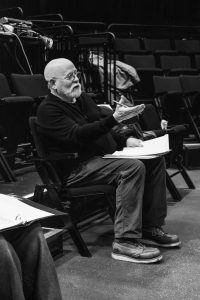New York City swindlers, otherwise known as real estate salesmen, find themselves in an anxiety-inducing pinch when they are informed that if they aren’t the top sellers in the office, they’ll be fired. As the desperation to sell premier plots and the desire to be at the top of the board sets in, Donna Summer is playing everywhere. Cakes are left out in the rain. And schemes are devised, followed by commencing dance interludes. Why? Because it’s the ‘70s and everyone can do whatever the hell they want!
The Seattle University Theatre Department’s winter quarter production will be “Glengarry Glen Ross,” a renowned play that received critical acclaim in the 1980s. While “Glengarry Glen Ross” is known for winning a Pulitzer Prize in 1984 for its depiction of American life and the 1992 film adaptation with Al Pacino, Alec Baldwin and other well-known male actors, it is also a play that was initially written with the roles reserved solely for men. Unlike the initial work, the theatre department’s version of “Glengarry Glen Ross” is set in the late ‘70s and reimagines the essence of a few particular characters to make the viewing experience unique.

Brennan Murphy, the director, expressed that he has been wanting to direct this production for over 20 years, and that pushing the time period back a few years allows for an additional lens to view the play from.
“The very first song we open with was a number one hit 50 years ago, and when I lived in New York during this period I would go out dancing. That’s what all these people would be doing,” Murphy said. “They could be selling [during the day] and then that night they’d go out and let loose. Have some drinks and dance, and the music they were dancing to would be Donna Summer.”
Jarrett Magdaleno, a second-year theatre major who plays George Aaronow, echoed Murphy’s sentiment and added that the set time period has made the production especially enjoyable.
“The ‘70s align pretty well with how bombastic you’re supposed to be on stage. There’s a lot of shaking of the shoulders and stuff like that. There’s a cadence to it and it’s really fun,” Magdaleno said.
The incorporation of the ‘70s aesthetics in combination with the dance interludes were to make the production more lively, as the original script is significantly darker. Murphy wanted audiences to be able to indulge in the more fun elements of the play, but in a way that still preserved the larger themes.
Murphy also expressed that the subject matter of this play has captivated himself and audiences alike, despite the writer’s poor reputation.
“People don’t like [David Mamet] but that’s not an excuse to not examine the work. What interests me about this play is the toxic masculinity and how that can be looked at through a different lens. The vitality of the language is also powerful and I’m all about doing projects that possess that,” Murphy said.
“Glengarry Glen Ross” deals with themes of morality and capitalism through a predominantly masculine lens, but Murphy wanted to encompass a larger view of this time. Another change that Murphy made was that he intentionally cast two of the most powerful characters as women.
Sarah Rodler, a double major in communications and theatre, plays John Williamson, who is primarily in charge of the leads that determine whether or not the salesmen in the office will be able to buy a Cadillac. Rodler said that the layer of femininity she gets to add to her character is different from previous roles she played.
“Learning to bring the womanhood into Williamson, that Williamson would have if she were a woman, was definitely a bit of a challenge. I think that I’m still trying to dig into what that is, but it’s definitely empowering,” Rodler said.
She also added that there are heightened moments throughout the play that would’ve been absent if her character had still been a man. There is a particular scene with Ben Freeman, who plays Shelley “The Machine” Levene, when he calls Rodler’s character a secretary, and the effect of that dialogue doesn’t exist in the original version.

Isabella Martinez, a third-year theatre major, plays Richard Roma, who is the top-seller in the office and has a rather large ego because of it. Martinez expressed that finding what works well for her character has been a challenging process.
“When I first started playing the character, I was leading with the mindset of acting like a man and thinking like a man, and I think that kind of confused me,” Martinez said. “I had to be like ‘Okay, no. I’m a woman. She’s a woman. What does it look like to be a strong, driven and successful woman in a male-dominated industry?”
While this production is set in the ‘70s, Martinez went on to add that people continue to struggle to understand women and even give them spaces to talk– it can be difficult as a female-embodied person to realize that having a voice, being successful and being hot and sexy at the same time is possible. Martinez hopes that the portrayal of women in this play leaves audiences instilled with inspiration.
“Members of audiences may have seen ‘Glengarry Glen Ross’ the movie or on Broadway, but they’ve never seen Brennan’s version. They haven’t seen ‘Glengarry Glen Ross’ gone disco or maybe they haven’t even seen the gender bending. There is so much substance to be found in this production in terms of how different it is,” Magdelano said.
“Glengarry Glen Ross” opens Valentine’s Day Feb. 14 and will have showings until Feb. 24.














